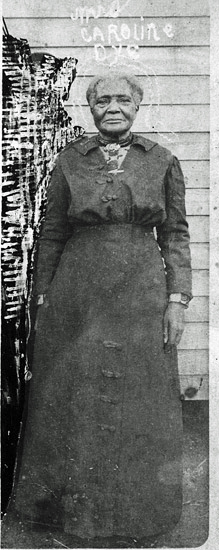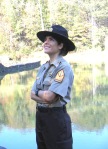I have an atypical Park Interpreter station here at Parkin Archeological State Park. The largest part of my job seems to be researching Arkansas History. Arkansas is an exceptionally colorful state, with complex and vivid stories about things you wouldn’t believe, not even if I told you. This is one of those great Arkansas stories- the story of Aunt Caroline Dye.

Aunt Caroline Dye
One of Arkansas’ biggest Blues legends wasn’t even a Blues singer at all. “Aunt” Caroline Dye, of Newport Arkansas, passed away September 26, 1918. Born a slave in Spartanburg South Carolina, immigrating to Arkansas some time in young adulthood, much of the rest of Caroline’s history is the stuff of Arkansas legend.
Well, I’m going to Newport just to see Aunt Caroline Dye.
Well, I’m going to Newport just to see Aunt Caroline Dye.
She’s a fortune teller, Ooh Lord, She sure don’t tell no lie.
– Hoo Doo Women, Johnny Temple
Caroline’s exceptional abilities started as a young child. When she was 10 years old and still a slave on the plantation, she was helping to set the table for Thanksgiving Dinner. She started insisting that they had not set enough plates, that Mister Charley was coming. Charley was the Plantation owner’s brother, who was thought to have been killed four years earlier in the Civil War. Sure enough, later that day Charley came walking in the door. The family couldn’t believe it! He relayed the fact that he had been wounded, taken prisoner, and had not had the chance to come home until that day. No one ever knew how she could have guessed such a thing, and all her little coincidences really started to be noticed after that.
“White and colored would go to her. You sick in bed, she raise the sick. … Had that much brains — smart lady. … That’s the kind of woman she was. Aunt Caroline Dye, she was the worst woman in the world. Had that much sense.”
– Band Leader Will Shade
Hers is an interesting Arkansas story- the story of an uneducated, African American woman who amassed a small fortune as a wealthy landowner, rental property entrepreneur, and most importantly, as a seer and rumored hoodoo woman- all of this while being unable to read or write. She is one of the most prominently featured women in the Delta Blues- though she herself was never a musician. The great Blues artists couldn’t keep away from her legend in their songs, too numerous for me to list them all here.
And she told my fortune as I walked through the door.
And she told my fortune as I walked through the door.
Said, “I’m sorry for you Buddy. Ooh Lord, your woman don’t want you no more.”
– Hoo Doo Women, Johnny Temple
Caroline became famous all over the Midsouth for her otherworldly abilities. She never advertised or charged for her services, but everyone always paid for them, one way or another. Affluent people from far and wide sought her services and feared her verdicts. Many prominent people would not make major decisions without at first consulting her, and if they could not bring themselves to consult her because of whatever reason, they did their best to avoid her altogether.
(Of Dye in her heyday) “…it is doubtful that even the name of President Wilson was more generally known.”
– John Quincy Wolf, Arkansas Folklorist
Speaking of the President, there was at least one Governor who took complete stock in her abilities. Governor-elect Donaghey refused to be inaugurated on either the 13th of the month, or on a Friday. He declared he had no desire to take the oath of office on “hoodoo” day. When asked when he thought the inauguration would take place, he replied “Probably Thursday the 14th or Monday the 18th. Wednesday the 13th, would of course be a bad day. Friday would never do.” – New York Times article, published January 6, 1909.
Aunt Caroline Dye she told me, “Son, these women don’t mean you no good.” Aunt Caroline Dye she told me, “Son, these women don’t mean you no good.”Said, “Take my advice and don’t monkey with none in your neighborhood”
– Aunt Caroline Dyer Blues, The Memphis Jug Band 1930
Celebrated by many, feared by most, Caroline Dye is an excellent example of a strong Arkansas woman having a profound effect on our history. Through the Delta Blues, many of her lessons are still available to the masses. An atypical muse, Caroline influenced some of the greatest blues songs ever written, maybe even the best blues song ever written- W.C. Handy’s St. Louis Blues.
Now dat gyspy tole her, “Don’t you wear no black,
Now dat gyspy tole her, “Don’t you wear no black,
Go to St. Louis, you can win him back”
– St. Louis Blues, W.C. Handy
Do you believe her? Get out sometime in our own backyard and explore history here in Arkansas- Aunt Caroline would tell you it’s a good idea.

Mary Anne Parker, Park Interpreter
Mary Anne Parker has been with Arkansas State Parks since 2005, and as Interpreter at Parkin Archeological State Park since 2006. Mary Anne’s primary focus at Parkin has been on the African American Experience in the Delta, and she is extremely proud of the growth in community support the park has experienced with the renovation and opening of the Northern Ohio School in 2006. Her other interests and activities include running the Parker Homestead, which she owns and operated with her husband and his parents, and writing grants to further educational opportunities for students attending Arkansas Delta public schools.





 Posted by Arkansas State Parks
Posted by Arkansas State Parks 

 Facebook
Facebook Twitter
Twitter YouTube
YouTube
